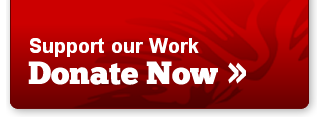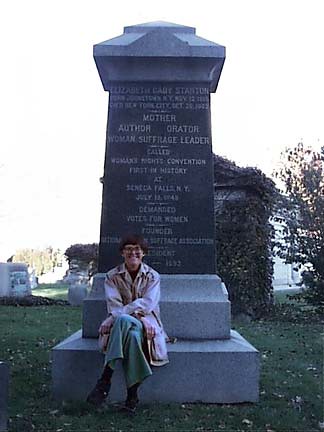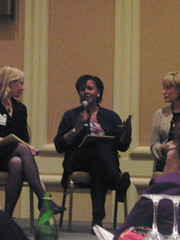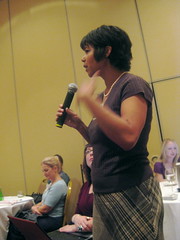The Access Sex panel on sex education, sexual health, and people with disabilities was just beautiful.
Panelists: Cory Silverberg (http://sexuality.about.com/mbiopage.htm), Bethany Stevens (Morehouse School of Medicine), Liz Henry (BlogHer), Jen Cole (GimpGirl)
Cory Silverberg opened by asking some questions about who was in the audience. Our audience was full of public health workers and health/sex educators and providers.
Then Cory asked what people want from the panel. What do they need to know?
A: How to deal with school, staff, parents. They don’t think the kids are at risk. How to get education across? Special ed classes also have to educate to multiple levels at once.
We didn’t get a lot of other answers, but I felt like this was a great trick of moderation, a good way to start the panel; it helped me feel connected with the people we were speaking to.
Bethany, Jen, and I each talked for about 10 minutes each. Bethany spoke on models of disability, medical vs. sociopolitical. I spoke about disability and sex. Jen then talked about GimpGirl, a successful, long-lived online community for women with disabilities. We spent the rest of the hour and a half on audience questions and discussions. It was a very lively discussion!
We mentioned the guide for health care providers for disabled women a lot, and here is the link to it: Table Manners and Beyond: The Gynecological Exam for Women with Developmental Disabilities and Other Functional Limitations. Please read it!
Bethany’s lightning talk on disability politics
Bethany introduced herself. “My CV is big and throbbing. I released myself from the shackles of Power Point and recommend it to you.” Going to talk about different models of disability. Also, with some personal narrative, personal examples of what I mean about different theories. Speaking on an embodied level.
There are two models I want to outline. First, the medical model of disability. I recommend you move away from that. Don’t use it in your work. It posits that the problem of disability is on the individual rather than on society. Rather than addressing structural issues of oppression, architectural or social, look at as a social issue with social and political solutions. Medical model puts an onus on individual to normalize their bodies. It puts us in a constricting box of normalcy. The medical model leads us away from civil rights ideology. By pushing the idea of normalcy we create more problems than solutions.
Second, the social model – I want to create a model of the world I want to live in. Michael Oliver in Britain. The idea of impairment is separate from the idea of disability. Separating a functional issue or condition from the social ramifications of that imapirment. For example I have osteogenesis imperfecta or brittle bones. The embodiment of that is being deemed subhuman. That may seem like a dramatic statement, but it is true. We are treated inhumanely. Cory suggests we are the most under-served population for sexual health, education and rights.
Think about the social meanings of disability.
I encourage you in your work to denounce and deconstruct these concepts. It is the first step in creating this revolution of embodiment. By doing this in your work it is liberatory not just for people with disabilities but for all other people. 80% of people in the U.S. will deal with disability in their lives. We have increasing elderly populations. Create that revolution of consciousness starting with young people, teach them that embodiment exists on a spectrum. There is a mental health problem of losing ability.
1) We’re often treated as children. I am constantly, people bend down in my face and use baby talk, sing song voice, the disabled people in the crowd here are nodding, it’s egregious. I’m a lawyer, shut up and treat me like a human. As I’m aging and becoming more mature, I realize that’s maybe not the best response. This issue is a bad one.
2) We are perceived as dependent, always needing help, we’re helpless. These things intertwine. Example, when I’m sitting anywhere, recently I was sitting texting someone in front of a building and two people in a row stopped to ask if I needed help. I didn’t look helpless or perplexed non-verbally or make any eye contact. But, of course on the other hand, there is something beautiful about that we sometimes need help, we are interdependent. There is beauty in helping each other.
3) Sexuality: it is very pertinent. Pivotal to my life path. Disability and sex focus. The common notion that we are asexual and undesirable. This is a pervasive assumption in all aspects of culture. It is very politically disempowering. We need to be allies with queer people and people of color. This is a tool of oppression, sexuality; stigamatizing our sexuality is a form of dehumanization. It means we are regarded as nonhumans. This legitimizes all sorts of abuse, exclusion, and exploitation. PWD have at least a 2 times higher rate of experiencing sexual abuse than the non-disabled. For example many are abused by caregivers. You might have a choice. Have a care giver? Get a bath plus sexual abuse? Or, not have care, and turn our abuser in? The stereotype of asexuality exists. Sexual silence. It’s about anxiety-producing issues; disability and sexuality are both anxiety producing. Exclusion from media representation. Not including PWD in teaching materials. Public health intervention plans don’t include us. Think about culture beyond race and ethnicity. Beyond the glbtq axis.
Interweaving some of my narrative. As a young person I was born this way, nowhere was disability mentioned in any classroom space at all. No matter the subject. Maybe in the Holocaust’s history but not really. Certainly not in sex ed. The stereotype was that we were asexual and undesirable. I was using dialup internet so I was trying to find info on sexuality on the internet, when I was 16 or so. There is not a lot of information. Dr. Tepper, Sexual health network is inclusive, has disability info online. Practical methods. Cory has a sex shop in Canada: Come as you are, that has a disability section. How do you make sex toys accessible. Just mentioning this counters the stereotypes. Gaps have been filled a little bit. Have information about specifically disability and sex, but mention disability in everything – in basic sex ed.
Cory – There are sex toys that strap on to you and you don’t have to use your hands. We train our people to say, “This is so you don’t have to use your hands, if you don’t want to, or for people who can’t hold the sex toy.” If you say that to a non disabled customer they say, “What do you mean?” and it becomes an educational moment with just those three words “or who can’t”.
That’s a cheap revolution!
Three ideas how to include disabilities in your work. Have it represented, outreach to young people. Figure out where they are. Are they getting sex ed? What are their needs? Talk to stakeholders. We are providing you that space right now, you can ask us those questions. You can tailor your message in a way that’s competent and not offensive. In public health you can’t just tweak your program a tiny bit and not alienate the culture you’re trying to serve. As much as I hate the word “normal”, make people more comfortable with disability, make it normalized. Put in a wheelchair in your visu
al images.
Liz’s talk on sex, disability, and sex ed
Then, I gave my bit of the talk, which is basically outlined in these notes. Some bits of my talk are missing because I improvised and told stories. (“Whiskey, Vicodin, and hold me when I cry” was the money quote…) Some bits in my outline I didn’t go into in the talk.
Then, Jen Cole gave her part of the talk and described GimpGirl. She worked from a written speech which maybe she’ll put up on the site and if so, I’ll link to it. Here’s my notes on what she said, a bit shorter than my notes on Bethany’s talk.
Jen’s talk on GimpGirl
– We were young queer women with disabilities and started our group online 11 years ago. We met through the “do it” program at U of Washington, and all felt isolated. We’re not trained professionals. We’re just women with disabilities who care about our communities. No degrees or certifications. We make our community what we want it.
GimpGirl has meetings weekly, about a hodgepodge of topics: political advocacy, support group, staff meeting. We all come up with projects and start going on them.
– We generally have a smart sassy geeky spirit in common.
– We started on Serenity MOO, kind of like a MUD. We had email lists. Moved to LJ in 2003. It is easier to maintain than mailing lists. Young women, queer women, art and culture. We branched out into Second life, Facebook, and Twitter in 2008.
– 850 people, 265 members on LJ. From all over the world. This last year, we were donated a fourth of a SIM on 2nd life. 3d embodiment. Connecting people with disabilities to 2nd life. Second Life brought a huge wave of growth to our community. It brought opportunities we didn’t know we were going to go after. Started to bring in financial support. Professionals in a myriad of different fields wanted to be part of our community. Women, disability communities hooked up with us.
– Recently we tried bringing in partners of PWD to talk with us about sexuality and whatever comes up in relationships.
– Problem with Second life, it’s not very accessible to a large population. Some people can’t access, older computers, limited finances, blind, visual processing issues, we also have an IRC channel with a live relay that goes back and forth between 2nd life and IRC, so people with visual impairments can participate.
– Examples of what our community is about. Partners meeting. The next day the girls were like “how did it go!” and they were just super curious. We realized that they wanted to do a singles meeting about sexuality. That was cool to me as an organizer to see women do that.
– Our community isn’t about sexuality specifically. For 11 years, it comes up a lot in discussion and story telling. We have a lot of Q and A within our own community.
– specific and general information.
– accessible gynecologist list. Who people think is good and bad. Are their offices accessible? What parts are accessible and what parts aren’t? Are they treated like human beings? Can they get on the exam tables? This info is on our wiki at gimpgirl.com.
We then went into audience comments and discussion.
q: panel idea great. I work for a hotline program in Massachusetts, sexual health, mariatalks.com All info thru lenses of characters. Accurate information. How can we make sure community is well represented in all our characters? I was a PCA for a while, the woman I worked for had awful experience with exams, being lifted up, put on a table. ER with capabilites? How do we know where to send someone?
Bethany – first question. Going to the stakeholders. Reading books is great, you learn about the sexual politics of disability. Tom Shakespeare et al. But talking to people is good. It is your responsibility to be culturally competent in your area. Find a group. So it’s not based on stereotypes and uses contemporary language. That’s inclusive. For example, we’ve moved away from the word “handicapped”, so it would be a bad idea to use that word.
(Dr. Sandra Welder. Peg Nosick from Texas. Curriculum for health providers. CROWD: Center for Research on Women with Disabilities. )
Second life and IRC questions.
Information on safer sex practices for people with disabilities?
– not a lot out there. sexy harm reduction. Put on a condom with your mouth.
– Liz: this is a good subject for brainstorming.
– There is good information about safer sex for people with cognitive disabilities.
Resources on developmentally disabled.
Cory – there’s lots of stuff. This is the one area that has a ton of stuff out there.
(I agree, it was a topic easy to find material by googling!)
Terri Couwenhoven. Downs Syndrome is in the title of the book. Teaching Children with Downs Syndrome About Their Bodies, Boundaries, And Sexuality: A Guide For Parents And Professionals.)
The Ultimate Guide to Sex and Disability. Excellent guide! Cory started that project.
Technology. As a blogger – Is the blog medium effective for getting across a message?
Liz: Yes! Twitter and Facebook also. Blogs mean you can speak at length, and the information is persistent. And it is current. Personal voice. Story telling is effective. Age brackets – MySpace/Facebook, LJ, etc Look at the disability blog carnivals, and Ouch (BBC’s disability site and group blog).
Who’s talking.com google different topics.
50% of population with disabilities doesn’t have access to sex ed.
Title 10 clinics in California. We invested money into that, into access, and there still is not a large number of women being served. Where do we find women who need the services? how can I help facilitate the connection? We want women with disabilities to be on our advisory boards or boards of directors (but can’t find any)
A: Mailing lists. Blogs. Contact existing organizations. There are a lot. (Independent living centers too but I forgot to say that.)
A: Bethany adds (again) not to expect people with disabilities to work for you for free and be grateful for the opportunity.
Competencies – tragic stories, clinic with restroom wheelchair access, the contractor build a hallway too narrow to get to it.
People who might be on the board? The bay area is one of largest populations. So you should be able to find someone.
– berkeley disabled group. has a mailing list.
– D-WILD
– Ed Roberts Campus groups
– Etc!!
Bethany – Working at Morehouse school of medicine. General advice to read about it first before they ask the questions.
sexualhealth.com
Guy in hat. 2nd year medical student at ucsd in reproductive health. san diego. noticed that youth grow up, teen years, development and growing. It is a huge transition and growing. Doctors, children transition from seeing a pediatrician to adult medicine. Pediatricians are family focused. Adult medicine focuses on disease and a person. That change is really important, causes stress on a patient.
Bethany mentions Dr. mirian kaufman. transition care, sexuality and disability.
jen – this was what our non profit was about, transition between your family and family helping with things and transitioning to adulthood. you’re thrust out there into nothing. not a lot of support for how to transition. how to move out on your own? attendant care a
nd health care.
We talk about people’s fear of giving PWD responsibility over their own health care.
Parents, caregivers, that want to protect that person with disability from becoming an adult, from experiencing their sexuality. it’s a huge issue.
The guy in the hat continues talking a couple of times about transition. Introduce physician early in teenage years. He is kind of repeating himself.
Bethany: This question as it keeps going is irritating to me. We continue to be viewed by that medical lens. Sure it’s important. But doctors do not dominate my life. We all deal with a transition plan. There should be services that help us because we do have to engage with the medical profession. However, that’s the one field where i’m NOT excluded! They want me there! Everywhere else I need some support! Medical expertise is just one facet.
Q: Physical accessiblity. I never see anyone who is disabled. Emotionally accessible. And, how can it be a safe space?
A: think of the glbt community , queer youth, tendency that we bring youth into our center, but we need to go outside our center to where they are, we need to bring community to them.
A: something like putting up a rainbow, disabled symbol?
A: In trans health – service providers often think they have never seen a trans person. But they probably have.
A: In questionnaires at our clinic, we haven’t had anyone who identifies with that population, as disabled.
aud – I have disability but can hide it. If I’m asked I don’t check that box. I don’t want to be seen through that lens necessarily and set off whatever will happen when I check that box.
aud: – thanks for talking about desire and sexuality as positive rather than something dangerous to be controlled. A lot of the panels this conference have been sex negative.
Other guy – curious about second life. Embodiment. How can you be embodied? Do you have to be able bodied?
A: Yes and no. The range of body types is not that varied. But people built wheelchairs and animations and other mods. If you go around in the mainstream world of 2nd life people will ask you a lot of questions about why you are in a wheelchair and why you would choose to represent yourself that way. They can be harassing or hostile.
Bethany: Everybody can fuck! It doesn’t matter what your body can do. We can have sex in all sorts of fun ways. Sex machines! Assistive devices! Expand the idea of pleasure and sexuality.
Now, about being inspirational! I should inspire you to have sex. If I can do it? You can do it!
(End of Panel)
I would like to add that despite our comments during the panel that you might want to pay people with disabilities to consult rather than expecting them to jump at the opportunity to work for you for free, three people approached me and asked me to do free work after this panel. They mean well and I respect that they want to be inclusive. I was not harsh about this in person, but actually, I feel a bit harsh on the subject. Some lady making like 90K a year working in public health? If her institute can’t afford to pay a consultant she can pay me or someone else with disabilities out of her own pocket to help her learn to do her job. I have a full time job and a complicated family life and I’m editing a book and, like, 6 blogs. It is a bit like, when women point out that technical conferences don’t have child care and then the conference organizers ask them to do the child care. Hello, if I’m doing the child care (for free no less) I won’t be participating in the technical conference will I? Pay for it, folks. Don’t exploit people because to you they look like the most exploitable people around.
Thanks to Cory Silverberg and Jen Cole for inviting me onto this panel! I confess I was sort of suspicious of Cory at first but he turned out more and more awesome over email and then incredibly awesome in person, I was sorry not to get to spend more time with him (and Bethany who I now adore). Jen and her partner and I went out to dinner and had a nice time; it was great to finally meet Jen who I have known online for a couple of years. I have to say also, SexTech was not a huge conference, maybe 300 to 500 people? But at this conference, in one afternoon, I saw and spoke with at least 8 people who were wheelchair users. At SXSW which was something like 5,000 or maybe way more people, there were 4 people in wheelchairs (more than I saw last time, and it felt amazing to me, but look what Sex Tech can do – I would like to challenge SXSWi to increase its outreach and invite more PWD to its conference.)






